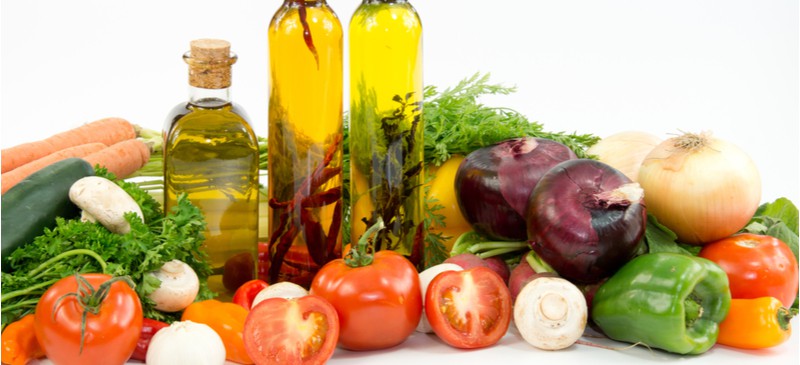
Many health experts consider the Mediterranean diet to be one of the most optimal ways to eat for disease prevention and longevity. A typical Mediterranean diet food list includes things like veggies, whole grains, fish, some cheeses, nuts and fruit. However a recent spin-off of the diet, called the “green Mediterranean diet,” focuses on plant foods that are commonly eaten in the Mediterranean region, such as Italy, Greece, Spain and Turkey.
Findings from one recent study indicate that a green Mediterranean diet might be even more powerful at improving cholesterol, blood pressure, body weight and markers of inflammation compared to a Mediterranean diet that includes more meat.
What Is the Green Mediterranean Diet?
The green Mediterranean diet, also called “green Med,” is a mostly vegan diet that emphasizes whole, unprocessed plant foods. The diet includes very little or no meat and minimal animal products.
According to an article published by the journal BMJ, green Med may be even better for health than the traditional Med diet that includes more animal-derived foods, such as poultry, cheese and meat.
While a traditional Med diet is known to promote heart and metabolic health, fight obesity and diabetes, and contribute to greater quality of life in older age, a green Med diet contains more plant foods, along with green tea and the sea vegetable known as Mankai (or duckweed), which are loaded with disease-fighting antioxidants.
How It Works
A green Mediterranean vegan diet — or that’s close to being vegan/vegetarian the majority of the time — is capable of improving health by providing essential vitamins, minerals and fatty acids, plus lots of fiber, phytonutrients and antioxidants.
Recent research published in the journal Heart suggests this type of Mediterranean diet can help lower one’s risk of coronary heart disease, stroke and diabetes.
These effects are thought to be due to high intake of polyphenols from foods/drinks like veggies, tea and seaweed; healthy fats from olive oil, nuts and seeds; and fiber from veggies, whole grains and fruit. At the same time, the green Med diet includes less saturated fat from red meat and little added sugar and other chemicals from processed foods.
Benefits
According to studies, following a green mediterranean diet plan can support cardiovascular, metabolic, cognitive, gut and immune health.
Here are some of the benefits linked to this type of plant-based diet:
- Lower risk for heart disease and stroke
- Protection against obesity and improved waist circumference/BMI (lower waist circumference is linked to metabolic health)
- Reduced risk for type 2 diabetes and metabolic syndrome
- Decreased hunger and cravings due to higher fiber and nutrient intake
- Improved cholesterol and blood pressure
- Enhanced insulin sensitivity
- Lower markers of inflammation
When researchers from the 2021 Heart study mentioned above sought out to determine whether a greener version of the Med diet was even more protective against disease development, they found evidence that it was. Their data showed that a green Med diet is higher in green plant food sources and even lower in red meat intake than a regular Med diet, which seems to help with weight maintenance and heart health.
Authors of the study concluded:
Following a green Med dietary pattern in conjunction with physical activity has the potential to be a major contributor to public health….Our findings suggest that additional restriction of meat intake with a parallel increase in plant-based, protein-rich foods, may further benefit the cardiometabolic state and reduce cardiovascular risk, beyond the known beneficial effects of the traditional Mediterranean diet.
Here are more details about the study and key benefits of the green Mediterranean diet that were uncovered:
The study included nearly 300 randomly assigned adults who were moderately obese and sedentary (with an average BMI of 31 and age of 51). Participants were split into three dietary groups:
- Those who received guidance on boosting physical activity and basic guidelines for achieving a healthy diet.
- Those who received the same physical activity guidance PLUS advice on following a calorie-restricted, traditional Med diet (1,500–1,800 kcal/day for men and 1,200–1,400 kcal/ day for women).
- Those who received physical activity guidance PLUS advice on following a similar calorie-restricted GREEN version of the Mediterranean diet.
Those following the green Med diet were told to avoid refined carbohydrates, red meat, poultry and processed meat and to emphasize vegetables and other plants, walnuts, several cups of green tea daily, and the aquatic plant called duckweed (also called Wolffia globosa, which is a cultivated Mankai strain that is high in protein).
After six months, the effect of each of the diets on weight loss and cardiovascular and metabolic risk factors was assessed.
Those on both types of Mediterranean diets lost weight. Those on green Med lost about 14 pounds on average (6.2 kg.), and those on the traditional Med diet lost about 12 pounds (5 kg.). Those following the “healthy diet” lost about three pounds ( 1.5 kg.).
READ RELATED: No10's Covid inquiry will probe if NHS's lack of capacity was to blame for lockdown
Waist circumference decreased by an average of 8.6 centimeters among those on the green Med diet compared with 6.8 centimeters for those on the regular Med diet and 4.3 centimeters for those on the healthy diet.
The green Med diet group by far saw the most improvements in “bad” LDL cholesterol. Other cardiovascular and metabolic risk factors also significantly improved more among those on the green Med diet, including improvements in blood pressure, insulin sensitivity and markers of inflammation (such as C-reactive protein, which has a key role in artery hardening).
Foods and Meal Plan
What foods are on the green Mediterranean diet?
- High-fiber foods, including veggies, fruits, seaweed, nuts, seeds, beans, legumes and whole grains
- Plant proteins, such as legumes, beans, vegan protein powders and seaweed (including duckweed, which is high in omega-3s and protein)
- High-antioxidant foods, like all sorts of veggies, fruits, herbs and spices, plus teas
- Olive oil and nuts (especially walnuts) or seeds, such as hemp, chia or flax, for healthy fats
- Dairy, such as yogurt, eggs and fish, in small amounts
Is tea a part of the Mediterranean diet? Yes!
Green tea is highly encouraged due to its rich supply of antioxidants. Participants in the Heart study drank three to four cups of green tea per day.
Some red wine, in moderation, as well as coffee can also be included.
What foods are not allowed on the Mediterranean diet?
- Processed meats (like salami, hot dogs, cold cuts, etc.)
- Red meats
- Poultry and fish (only in very small amounts)
- Cheeses and dairy in high amounts
- Processed foods
- Added sugar
Can you have any packaged foods? For example, is oatmeal OK on the Mediterranean diet?
As much as possible, eat fresh foods, and limit things that have been processed. Read ingredient labels, and aim for foods with the least additives.
If you buy oatmeal, purchase products containing only whole/steel cut oats, instead if refined oats with added sugar and flavors.
How do you do the green Mediterranean diet?
The key is to eat plenty of plant foods, fiber and healthy fats.
Here’s an example of a green Mediterranean diet meal plan for one day:
- Breakfast: Smoothie made with vegan protein powder, plus chia seeds, fruit and spinach. Also have cup of green tea or coffee.
- Lunch: Salad with beans, nuts, diced veggies and olive oil dressing. Also have plenty of water plus a cup of green tea.
- Dinner: Bean and veggie soup with salad and whole grain bread.
What are some recipes to try?
If you’re ready to ditch processed foods and eat a clean, plant-based diet, they these Mediterranean diet recipes:
Risks and Side Effects
When following a plant-based diet, it’s important to make sure you consume enough protein. To prevent fatigue, weakness and increased hunger, include plenty of plant protein in your meals, such as beans, legumes and vegan protein powder.
Remember that even if you find it hard to eat entirely plant-based (or a vegan diet), you can still benefit from including a lot of plant foods in your diet and cutting out processed meats.
As always, if you have any medical issues and take medications, speak with your doctor before drastically changing your diet.
Conclusion
- Recent studies suggest that a “green Med” diet may be even better for health than the traditional Med diet that includes more animal-derived foods, such as poultry, cheese and meat.
- A green Med diet can promote heart and metabolic health, fight obesity and diabetes, and contribute to quality in life in older age.
- To follow this type of eating plan, consume more plant foods, along with green tea and seaweeds, to obtain lots of disease-fighting antioxidants and fiber.
Source:








